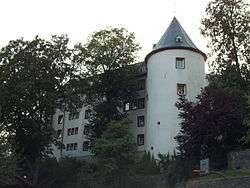Lennestadt
| Lennestadt | ||
|---|---|---|
|
Bilstein Castle | ||
| ||
 Lennestadt | ||
Location of Lennestadt within Olpe district 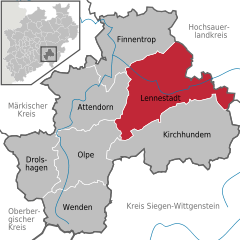
 | ||
| Coordinates: 51°7′25″N 8°4′5″E / 51.12361°N 8.06806°ECoordinates: 51°7′25″N 8°4′5″E / 51.12361°N 8.06806°E | ||
| Country | Germany | |
| State | North Rhine-Westphalia | |
| Admin. region | Arnsberg | |
| District | Olpe | |
| Government | ||
| • Mayor | Stefan Hundt (CDU) | |
| Area | ||
| • Total | 135.06 km2 (52.15 sq mi) | |
| Population (2015-12-31)[1] | ||
| • Total | 26,073 | |
| • Density | 190/km2 (500/sq mi) | |
| Time zone | CET/CEST (UTC+1/+2) | |
| Postal codes | 57368 | |
| Dialling codes | 02721, 02723, 02972 u. 02725 | |
| Vehicle registration | OE | |
| Website | www.lennestadt.de | |
Lennestadt (occasionally also die Lennestadt) lies in the Sauerland in southeast North Rhine-Westphalia and is a community in Olpe district. It is the district’s most populous municipality. Lennestadt itself is not an actual town but a community which comprises several towns and villages.
Geography
Lennestadt lies at the common point of the Ebbegebirge (in the west), Homert and Rothaargebirge (in the east) Nature Parks and is crossed by the river Lenne, a tributary to the Ruhr. Besides the Hundem, which empties into the Lenne in the outlying centre of Altenhundem, the Veischede also feeds this river.
Lennestadt’s position is 51° 03' to 51° 12' N, 7° 58' to 8° 15' E. The town’s highest point is the Härdler (756 m), and its lowest is on the Lenne near Borghausen (239 m).
Neighbouring communities
Lennestadt borders in the north on the communities of Eslohe and Finnentrop, in the east on Schmallenberg and Bad Berleburg, in the south on Kirchhundem, and in the west on the towns of Attendorn and Olpe.
Constituent communities
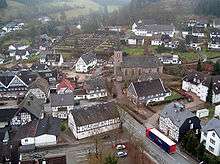
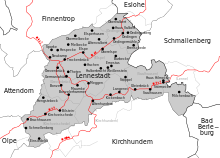
Within Lennestadt’s municipal area lie the following centres:
Altenhundem, Altenvalbert, Bilstein, Bonzel, Bonzelerhammer, Brenschede, Bruchhausen, Burbecke, Elspe, Elsperhusen, Einsiedelei, Germaniahütte, Gleierbrück, Grevenbrück, Habbecke, Hachen, Haus Hilmecke,Haus Valbert, Halberbracht, Hengstebeck, Hespecke, Kickenbach, Kirchveischede, Kracht, Langenei, Maumke, Meggen, Melbecke, Milchenbach, Oberelspe, Obermelbecke, Obervalbert, Oedingen, Oedingermühle, Oedingerberg (formerly Berge), Saalhausen, Sporke, Stöppel, Theten and Trockenbrück.
The fact that there is not a physical town Lennestadt, but Lennestadt being an aggregation of smaller towns listed above, often leads to confusion among visitors.
History
The town of Lennestadt was founded on 1 July 1969 as legal successor to the Amt of Bilstein out of seven former communities and outlying centres.
The earliest traces of settlers in the current municipal area date to the Early Middle Ages. The centres of Elspe and Oedingen were first mentioned in a document in 1000 that Emperor Otto III had issued. This makes them the oldest places in Olpe district.
In the 19th century, parts of the current town area were characterized by mining, ironworking and metalworking.
Amalgamations
In 1975, Milchenbach was joined with Lennestadt. It had formerly belonged to the community of Lenne (now part of Schmallenberg).
Population development
| Year | Population figure | Population development graph |
|---|---|---|
| 1998 | 27,846 | 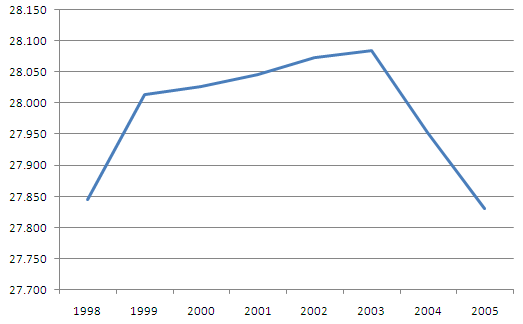 |
| 1999 | 28,013 | |
| 2000 | 28,026 | |
| 2001 | 28,046 | |
| 2002 | 28,072 | |
| 2003 | 28,084 | |
| 2004 | 27,953 | |
| 2005 | 27,831 |
Politics
Town council
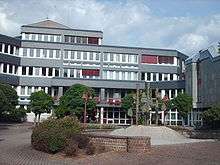
| Municipal election results, 25 May 2014 | |||||
| Party | Votes | ± as against 2009 | Seats | ||
| CDU | 50.6% | -9.0% | 20 | ||
| SPD | 30.5% | +2.4% | 11 | ||
| Grüne | 10.9% | -0.2% | 4 | ||
| Free Voters | 7.1% | +7.1% | 3 | ||
| Other | 0.9% | -0.3% | - | ||
The current mayor is Stefan Hundt, of the CDU. The turnout was 49.2%.
Mayor
Until 1997, Lennestadt’s chief administrator bore the title Stadtdirektor (“Town Director”). The Bürgermeister, or Mayor, was an honorary office and was mainly ceremonial.
| Time in office | Chief administrator | Honorary mayor (until 1997) |
| July 1969 to November 1969 | Erwin Krollmann (CDU), Commissioner for the Fulfilment of the Town Director’s Duties | Heinrich Hanfland (CDU), Commissioner for the Fulfilment of the Council Chairman’s Duties |
| December 1969 – 1989 | Erwin Krollmann (CDU) |
|
| 1989–1997 | Dr. Franz-Josef Kaufmann (SPD) | Hubert Nies (CDU) |
| 1997–2009 | Alfons Heimes (CDU) | |
| 2009–today | Stefan Hundt (CDU) | |
National and regional elections
| Party | 2009 election | 2013 election | 2010 state election | 2012 state election |
|---|---|---|---|---|
| CDU | 42.3% | 47.7% | 46.2% | 37.7% |
| SPD | 27.2% | 31.3% | 32.0% | 37.6% |
| FDP | 13.5% | 4.5% | 5.4% | 6.6% |
| Grüne | 6.4% | 4.2% | 7.6% | 4.8% |
| Linke | 6.5% | 4.3% | 4.1% | 1.6% |
| AfD | - | 3.9% | ||
| Pirate Party | - | - | 0.8% | 6.2% |
| Other | 4.1% | 4.1% | 3.9% | 3.5% |
Coat of arms
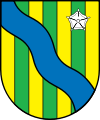
The town’s arms were conferred on 31 December 1971. The gold and green bars in the background were taken from the arms formerly borne by the Amt of Bilstein. The wavy bend stands for the river Lenne, the town’s namesake, and the rose comes from the outlying centre of Oedingen.
Town patron
Town council decided in 1995 to name Sir Thomas More as the town’s patron. Since 2001, the town has been awarding the Thomas-Morus-Preis to citizens “who in their acts have let themselves be led by the convictions of their conscience and who without regard to possible personal disadvantages through bravery and moral courage have thereby become examples to the good of others and our society.”[2]
Town partnership
The town of Lennestadt entered into a partnership with the town of Otwock in Poland in 1992. In May 2006, a cycling tour was held which saw 32 participants ride from Lennestadt by way of Berlin and Warsaw to Otwock as a symbol of solidarity.
Culture and sightseeing
Theatre
The Kulturgemeinde Hundem-Lenne, founded in 1946, offers a cultural programme in the Pädagogisches Zentrum (PZ, “Educational Centre”), a venue with 480 seats at the Anne-Frank-Hauptschule in Meggen.
Museum
In Grevenbrück is found the town museum, the Museum der Stadt Lennestadt in whose building the town’s homeland and regional studies library and the town archive are also to be found.
Since 1998, the Förderverein Bergbaudenkmäler Lennestadt (“Lennestadt Mining Monument Development Association”) has run the Bergbaumuseum Siciliaschacht (“Sicilia Mineshaft Mining Museum”) in Meggen, which recalls the town’s mining tradition.
Buildings
Among well known buildings in Lennestadt are Bilstein Castle (Burg Bilstein), the Peperburg castle ruins, many timber frame houses, the so-called Sauerlandpyramiden, the Sicilia Mineshaft and the Hohe Bracht viewing tower. On Bundesstraße 55 between Oedingen and Eslohe, the Madonna der Straße (“Madonna of the Road”) roadside shrine is to be found.
 Museum of Lennestadt
Museum of Lennestadt Madonna der Straße
Madonna der Straße Peperburg castle ruins
Peperburg castle ruins Siciliaschacht mining museum
Siciliaschacht mining museum Old smithy in Altenhundem
Old smithy in Altenhundem Church of St. Agatha in Altenhundem
Church of St. Agatha in Altenhundem
Parks
A spa is to be found in the outlying centre of Saalhausen, which is a recognized Luftkurort (“air spa resort”).
Regular events
Among the town’s regular events is the traditional Schützenfest (“fair featuring shooting matches”) that is held in all of the bigger centres each year. Furthermore, every August there is a town festival lasting several days which since 2005 has been held together with the Sauerländer Straßenmusiker-Festival (“Sauerland Street Musicians’ Festival”) in Altenhundem.
Economy and infrastructure
Economy
Lennestadt is home to a variety of small and middle-sized businesses, mainly in the manufacturing field. Most prevalent are companies in the metal-working, machine building, automotive parts supply, and electrical industry.
Public institutions
Lennestadt’s town hall is located in the central constituent community of Altenhundem.
The local court, the Amtsgericht Lennestadt, is located in the outlying centre of Grevenbrück.
Transport
Local public transport
With its Altenhundem, Grevenbrück (Westf.) and Lennestadt-Meggen stations, Lennestadt lies on the Ruhr-Sieg line from Hagen to Siegen.
Furthermore, buslines of the Verkehrsbetriebe Westfalen-Süd (VWS, “Westphalia-South Transport Services”) and Busverkehr Ruhr-Sieg (BRS, “Ruhr-Sieg Bus Transport”) run to Kirchhundem, Olpe, Hilchenbach, Finnentrop, Schmallenberg, Meschede and Attendorn.
Historical
Until 1944 there was another railway connection to Erndtebrück by the Altenhundem–Birkelbach railway line, whose bridges, however, were blown up by retreating units of the German army in the Second World War. Parts of the tunnels are still preserved.
The line to Wenholthausen was still run until the mid-1960s. At this time, Altenhundem was said to be a railway village.
Private transport
The Federal Highways (Bundesstraßen) B 55 and B 517 run through the town.
Cycle transport
Lennestadt is connected to the North Rhine-Westphalia Cycle Transport Network (Radverkehrsnetz NRW) and furthermore lies on the Lenneroute running from the Lenne’s source on the Kahler Asten down to its mouth at the Hohensyburg (castle).
Media
The Westfalenpost and the Westfälische Rundschau each have a local edition in Lennestadt and appear as daily newspapers. As well, the advertising sheets Sauerlandkurier and Sauerländer Wochenanzeiger come out on Wednesdays and Sundays.
Lennestadt belongs to the Westdeutscher Rundfunk Siegen studio area. News from the South Sauerland is broadcast on WDR 2 and in local broadcasts on WDR Fernsehen.
Education
Lennestadt is home to many elementary schools, one special school whose emphasis is on learning, Hauptschulen, Realschulen and two Gymnasien. Both the Gymnasium der Stadt Lennestadt as well as the Gymnasium Maria Königin are located in Altenhundem. Moreover, there is a folk high school and a professional college. Lennestadt furthermore lies in the feeder area of the University of Siegen.
Famous people
Honorary citizens
- Paul Tigges, writer
Sons and daughters of the town
- Johannes Becker, politician, Member of the Reichstag
- Reinhold Bicher, painter
- Harry Blum, politician and former Chief Mayor of Cologne
- Christel Frese, athlete
- Adolf Hennecke, “Activist of the first hour” in East Germany
- Theo Kruse, politician, Member of the Landtag
- Benjamin Mikfeld, politician
- Hubert Mohr, former Pallottine, later historian in East Germany
- Karl Joseph Cardinal Schulte, Archbishop and Cardinal
- Peter Soemer, theologian and poet
- Margareta Wolf, politician
- Thomas Hebbeker, professor RWTH Aachen
People connected with the town
- Helmut Körschgen, amateur exhibitor
- Josefa Berens-Totenohl, writer
External links
| Wikimedia Commons has media related to Lennestadt. |
References
- ↑ "Amtliche Bevölkerungszahlen". Landesbetrieb Information und Technik NRW (in German). 18 July 2016.
- ↑ Thomas Morus – Stadtpatron von Lennestadt
